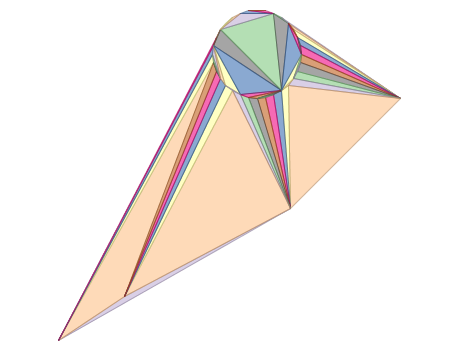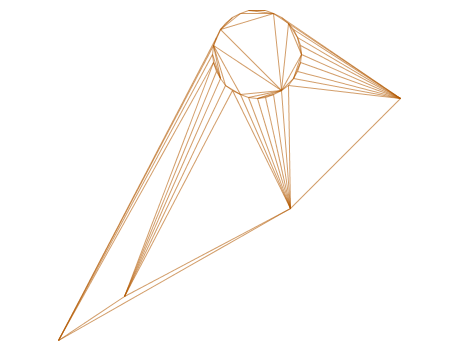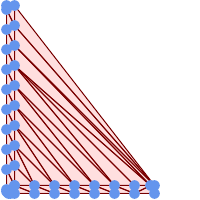ST_DelaunayTriangles
Name
ST_DelaunayTriangles — Returns the Delaunay triangulation of the vertices of a geometry.
Synopsis
geometry
ST_DelaunayTriangles
(
geometry
g1
, float
tolerance = 0.0
, int4
flags = 0
)
;
Description
Computes the
Delaunay triangulation
of the vertices of the input geometry.
The optional
tolerance
can be used to snap nearby input vertices together,
which improves robustness in some situations.
The result geometry is bounded by the convex hull of the input vertices.
The result geometry representation is determined by the
flags
code:
-
0- a GEOMETRYCOLLECTION of triangular POLYGONs (default) -
1- a MULTILINESTRING of the edges of the triangulation -
2- A TIN of the triangulation
Performed by the GEOS module.
Availability: 2.1.0
 This function supports 3d and will not drop the z-index.
This function supports 3d and will not drop the z-index.
 This function supports Triangles and Triangulated Irregular Network Surfaces (TIN).
This function supports Triangles and Triangulated Irregular Network Surfaces (TIN).
Examples

Original polygons
our original geometry
ST_Union(ST_GeomFromText('POLYGON((175 150, 20 40,
50 60, 125 100, 175 150))'),
ST_Buffer(ST_GeomFromText('POINT(110 170)'), 20)
)
|

ST_DelaunayTriangles of 2 polygons: delaunay triangle polygons each triangle themed in different color
geometries overlaid multilinestring triangles
SELECT
ST_DelaunayTriangles(
ST_Union(ST_GeomFromText('POLYGON((175 150, 20 40,
50 60, 125 100, 175 150))'),
ST_Buffer(ST_GeomFromText('POINT(110 170)'), 20)
))
As dtriag;
|

-- delaunay triangles as multilinestring
SELECT
ST_DelaunayTriangles(
ST_Union(ST_GeomFromText('POLYGON((175 150, 20 40,
50 60, 125 100, 175 150))'),
ST_Buffer(ST_GeomFromText('POINT(110 170)'), 20)
),0.001,1)
As dtriag;
|

-- delaunay triangles of 45 points as 55 triangle polygons
this produces a table of 42 points that form an L shape SELECT (ST_DumpPoints(ST_GeomFromText( 'MULTIPOINT(14 14,34 14,54 14,74 14,94 14,114 14,134 14, 150 14,154 14,154 6,134 6,114 6,94 6,74 6,54 6,34 6, 14 6,10 6,8 6,7 7,6 8,6 10,6 30,6 50,6 70,6 90,6 110,6 130, 6 150,6 170,6 190,6 194,14 194,14 174,14 154,14 134,14 114, 14 94,14 74,14 54,14 34,14 14)'))).geom INTO TABLE l_shape; output as individual polygon triangles SELECT ST_AsText((ST_Dump(geom)).geom) As wkt FROM ( SELECT ST_DelaunayTriangles(ST_Collect(geom)) As geom FROM l_shape) As foo; wkt POLYGON((6 194,6 190,14 194,6 194)) POLYGON((14 194,6 190,14 174,14 194)) POLYGON((14 194,14 174,154 14,14 194)) POLYGON((154 14,14 174,14 154,154 14)) POLYGON((154 14,14 154,150 14,154 14)) POLYGON((154 14,150 14,154 6,154 14))
|
Example using vertices with Z values.
3D multipoint SELECT ST_AsText(ST_DelaunayTriangles(ST_GeomFromText( 'MULTIPOINT Z(14 14 10, 150 14 100,34 6 25, 20 10 150)'))) As wkt; wkt GEOMETRYCOLLECTION Z (POLYGON Z ((14 14 10,20 10 150,34 6 25,14 14 10)) ,POLYGON Z ((14 14 10,34 6 25,150 14 100,14 14 10)))